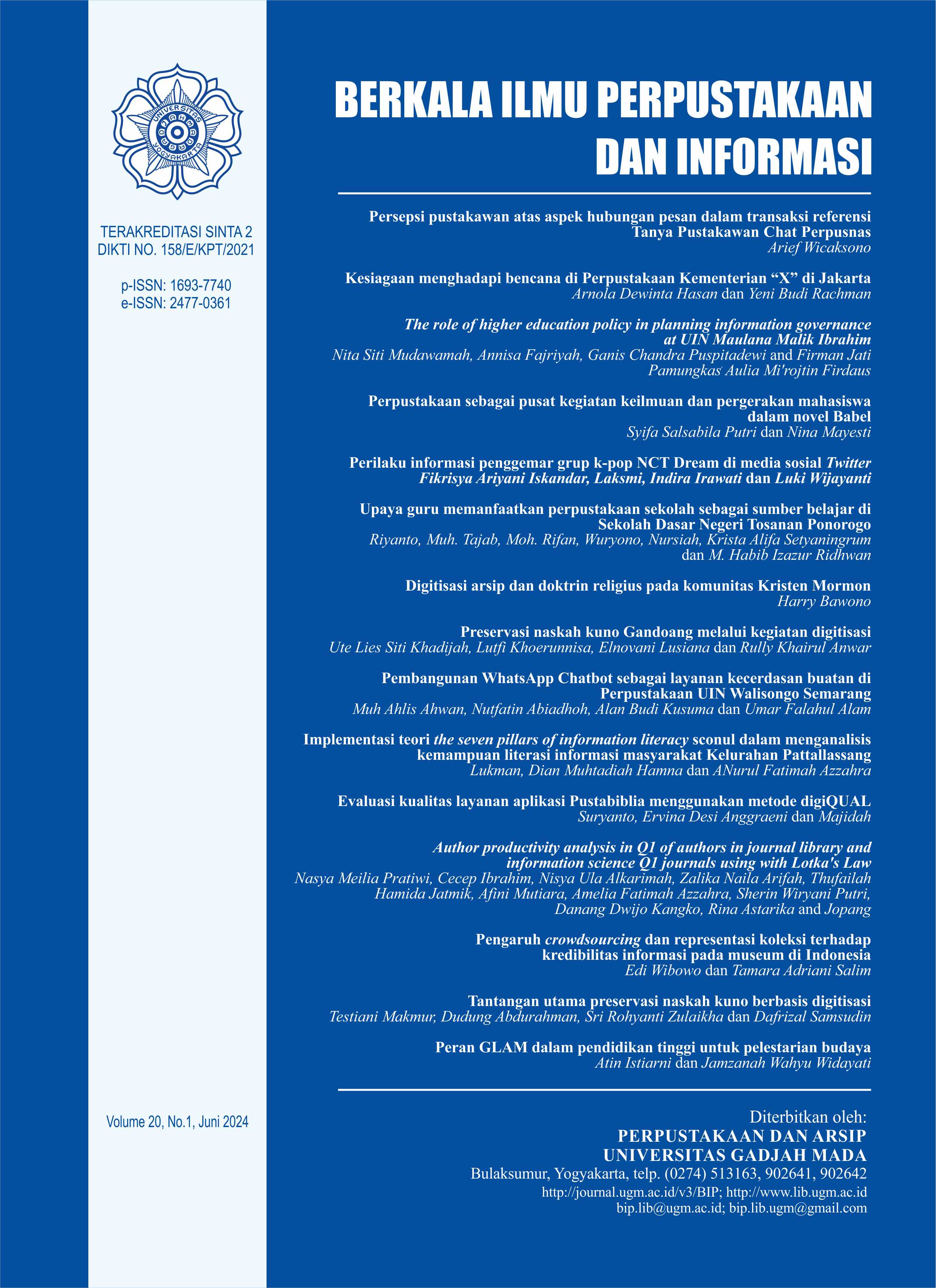The role of higher education policy in planning information governance at UIN Maulana Malik Ibrahim
Abstract
Introduction. This study aims to explore the role of higher education policy in planning information governance at the Islamic university, UIN Maulana Malik Ibrahim.
Data Collection Methods. The datacollection technique involved was depth interviews with LPM expert staff, the head of the general division of the faculty, public relations, and an archivist. In addition, to conduct the interviews, reference materials were collected to compile previous studies.
Data Analysis. The data analysis technique encompassed data reduction, data presentation, and conclusion drawing and verification.
Results and Discussion. There is an important role of higher education policy in the process of information management at UIN Maulana Malik Ibrahim. This formulation refers to principles of information governance, which include definition of each party's role, the development of policies and implementation strategies in the governance process, monitoring and auditing of processes and stages of the governance process, information organization processes, and classification. Information, stakeholder participation, and the long-term viability of information governance processes are all important considerations.
Conclusion. Information governance should conducted by the policies established by the relevant educational institution. If the information creation, processing, and governance divisions work properly, locating and acquiring information for institutional reasons should be a breeze.
References
Daneshmandnia, A. (2019). The influence of organizational culture on information governance effectiveness. Records Management Journal, 29(1/2), 18–41. https://doi.org/10.1108/RMJ-09-2018-0033
Fajriyah, A. (2015). Manajemen informasi Bank Indonesia: Implementasi dan perkembangan manajemen informasi pada badan publik. [Thesis, Universitas Gajah Mada].
Fajriyah, A., & Novian, R. M. (2023). Management Information of Public Institutions. Record and Library Journal, 9(1), 127–140. https://doi.org/10.20473/rlj.V9-I1.2023.127-140
Gartner. (2018). Gartner says master data management is critical to achieving effective information governance. http://www.gartner.com/newsroom/id/1898914
Huberman, A. M., & Miles, J. S. M. B. (2019). Qualitative data analysis: A methods sourcebook. Sage Publications Inc.
Kementerian Agama. (2018). Peraturan Menteri Agama Republik Indonesia Nomor 2 Tahun 2018 tentang perubahan atas Peraturan Menteri Agama Nomor 8 Tahun 2013 tentang organisasi dan tata kerja Universitas Islam Negeri Maulana Malik Ibrahim Malang. https://infoperaturan.id/peraturan-menteri-agama-nomor-2-tahun-2018/
Lappin, J., Jackson, T., Matthews, G., & Ravenwood, C. (2021). Rival records management models in an era of partial automation. Archival Science, 21(3), 243–266. https://doi.org/10.1007/s10502-020-09354-9
Lasambouw, I. F., & Kurniasih, N. (2016). Pengelolaan arsip vital pada kantor arsip Universitas Indonesia. Jurnal Utilitas, 2(1), 54–63. https://doi.org/10.22236/utilitas.v2i1.4559
Mikalef, P., Boura, M., Lekakos, G., & Krogstie, J. (2020). The role of information governance in big data analytics driven innovation. Information & Management, 57(7), 103361 [1-15]. https://doi.org/10.1016/J.IM.2020.103361
Muhammad, J. S., Isa, A. M., Samsudin, A. Z. H., & Miah, S. J. (2020). Critical factors for implementing effective information governance in Nigerian universities: A case study investigation. Education and Information Technologies, 25(6), 5565–5580. https://doi.org/10.1007/s10639-020-10206-3
Muhammad, J. S., Miah, S. J., Isa, A. M., & Samsudin, A. Z. H. (2022). Investigating importance and key factors for information governance implementation in Nigerian Universities. Education and Information Technologies, 27(4), 5551–5571. https://doi.org/10.1007/s10639-021-10817-4
Mullon, P. A., & Ngoepe, M. (2019). An integrated framework to elevate information governance to a national level in South Africa. Records Management Journal, 29(1/2), 103–116. https://doi.org/10.1108/RMJ-09-2018-0030
Setyawan, H., Priyanto, I. F., & Ratminto, R. (2019). Kedudukan kelembagaan dan praktik pengelolaan arsip di lingkungan perguruan tinggi: Studi pada Universitas Gadjah Mada, Universitas Negeri Yogyakarta, dan Universitas Pembangunan Nasional Veteran Yogyakarta. Khazanah: Jurnal Pengembangan Kearsipan, 12(1), 1–22. https://doi.org/10.22146/khazanah.46151
Smallwood, R. F. (2020). Information governance: Concepts, strategies and best practices (Second Edi). John Wiley & Sons, Inc.
Sugiyono. (2021). Metode Penelitian Kuantitatif, Kualitatif, dan R&D. Alfabeta.
Tallon, P. P., Ramirez, R. V., & Short, J. E. (2014). The Information artifact in IT governance: Toward a theory of information governance. Journal of Management Information Systems, 30(3), 141–178. https://doi.org/10.2753/MIS0742-1222300306
Tan, K. H., Zhan, Y., Ji, G., Ye, F., & Chang, C. (2015). Harvesting big data to enhance supply chain innovation capabilities: An analytic infrastructure based on deduction graph. International Journal of Production Economics, 165(Special issue), 223–233. https://doi.org/10.1016/j.ijpe.2014.12.034
Copyright (c) 2024 Berkala Ilmu Perpustakaan dan Informasi

This work is licensed under a Creative Commons Attribution-ShareAlike 4.0 International License.
Berkala Ilmu Perpustakaan dan Informasi is licensed under a Creative Commons Attribution-ShareAlike 4.0 International License.
- Articles published in Berkala Ilmu Perpustakaan dan Informasi are licensed under a Creative Commons Attribution-ShareAlike 4.0 International license. You are free to copy, transform, or redistribute articles for any lawful purpose in any medium, provided you give appropriate credit to the original author(s) and Berkala Ilmu Perpustakaan dan Informasi, link to the license, indicate if changes were made, and redistribute any derivative work under the same license.
- Copyright on articles is retained by the respective author(s), without restrictions. A non-exclusive license is granted to Berkala Ilmu Perpustakaan dan Informasi to publish the article and identify itself as its original publisher, along with the commercial right to include the article in a hardcopy issue for sale to libraries and individuals.
- By publishing in Berkala Ilmu Perpustakaan dan Informasi, authors grant any third party the right to use their article to the extent provided by the Creative Commons Attribution-ShareAlike 4.0 International license.






